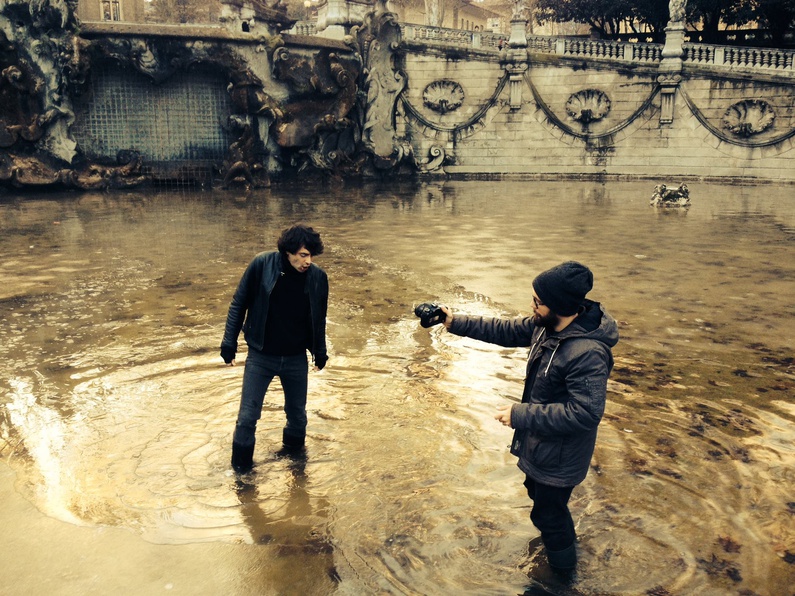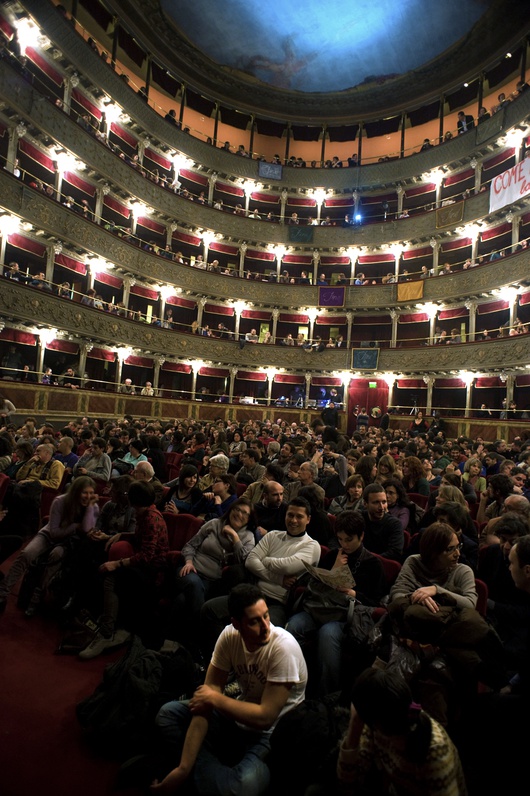
Italy's cultural capital and young entrepreneurs
Published on
Translation by:
Abigail WatsonThe industry of Italian cultural enterprises forms 15% of Italy's GDP. And yet, to free themselves from the jungle of irregular contracts prevalent in the industry, gifted young people are flying to France, London, or New York. What will be left of the erstwhile mine of global culture?
New businesses in Turin are born outside of the city centre. No chimney stacks or vents; all they need is a desk, a computer and a high-speed internet connection. Earphones are replaced by a pair of headphones; the noise of the production line by an indie song. Far from the smoke of the Mirafiori suburb where Fiats are produced, the new factories take shape, in perfect harmony with the fabric of the city. Rather than cars and textiles, they produce culture and creativity. It is predominantly young people between 25 and 35 years of age who have taken the decision to challenge the crisis, striking at its very core.
Spreading their wings
Giuseppe Moreto is a video-maker and founder of Dewrec, a lively, modern video production unit, which he manages collectively with some of his peers, bringing together a plethora of different skills. Giuseppe is attempting to free himself from the heavy label of everlasting youth by reinventing the message and appearance of his productions. He tells us that the grammar of communication has changed radically since he produced videos for the Italian band Subsonica, as illustrated by the paradox of MTV, which has been transformed from a music channel into a space reserved for the transmission of American reality shows. It is widely believed that anyone can make a video these days; the video camera is stored in the basement and replaced by a smartphone, but finding the value added in every piece of work is the true key to success. Hitting upon the right combination of creativity and quality needs more than just an app. It was thought that, thanks to the artistic patrimony present in Italy, culture could be simply distributed and not created.
 And so a silent army of artists, actors, graphic designers, philosophers and communicators beat a retreat, escaping to the bright lights of London, slipping away among the skyscrapers of New York and the lakes of Canada, or heading to even more exotic destinations. They are seeking recognition for their abilities, rather than the coronation of a dream. This is how Italy banishes them, with no goodbye and avoiding the dreaded farewell, sending them off on a budget flight with a computer or a tablet. A small number of fearless young people remain in the country, fewer still continue to believe that culture can provide their bread and butter. And yet this is the case, despite the limited credence some ministerslend these dreams; culture and creativity can truly be the life raft in the crisis.
And so a silent army of artists, actors, graphic designers, philosophers and communicators beat a retreat, escaping to the bright lights of London, slipping away among the skyscrapers of New York and the lakes of Canada, or heading to even more exotic destinations. They are seeking recognition for their abilities, rather than the coronation of a dream. This is how Italy banishes them, with no goodbye and avoiding the dreaded farewell, sending them off on a budget flight with a computer or a tablet. A small number of fearless young people remain in the country, fewer still continue to believe that culture can provide their bread and butter. And yet this is the case, despite the limited credence some ministerslend these dreams; culture and creativity can truly be the life raft in the crisis.
a jungle of contracts
As in every sector, the factories of culture follow the industries of knowledge and innovation. Acquired knowledge is not consumed; it neither burns in a blast furnace, nor evaporates, but remains within society, feeding external effects in every manufacturing industry. We can all enjoy the benefits of investment in knowledge.
 During a period in which the only solution to youth unemployment seems to be reduced safeguards and rights, no one cares about creating new professions. In a world which is changing before our eyes, in which billions of calculations can be precisely conducted in a fraction of a millisecond, nobody cares about creating new professional roles. People only look for skills capable of quantifying the world and its complexity; never for somebody who can qualify it. And yet, the crisis is less of a burden for cultural enterprises: They have an added value of 76 billion- equivalent to 5.4% of GDP. They generate skilled jobs for 140 thousand people and huge numbers of young people who are able to reinvent a career for themselves. The cultural industry has the highest rate of re-entry, boasting a multiplier of 1.7: This means that for every euro of added value created, an average of 1.7 euros is created in other industries. In this way, the entire cultural industry amounts to 15.3% of GDP.
During a period in which the only solution to youth unemployment seems to be reduced safeguards and rights, no one cares about creating new professions. In a world which is changing before our eyes, in which billions of calculations can be precisely conducted in a fraction of a millisecond, nobody cares about creating new professional roles. People only look for skills capable of quantifying the world and its complexity; never for somebody who can qualify it. And yet, the crisis is less of a burden for cultural enterprises: They have an added value of 76 billion- equivalent to 5.4% of GDP. They generate skilled jobs for 140 thousand people and huge numbers of young people who are able to reinvent a career for themselves. The cultural industry has the highest rate of re-entry, boasting a multiplier of 1.7: This means that for every euro of added value created, an average of 1.7 euros is created in other industries. In this way, the entire cultural industry amounts to 15.3% of GDP.
However, behind the creation of these numbers is an army of temporary employees, who are silently fighting amidst a jungle of contracts, regulations and recognition. People like Marco, a young theatre actor from Turin who, tired of facing suffocating insecurity, escapes to France to perform, or Alessandra, a young talented web designer who, after completing her internship, attends an English course because ‘you never know’.
Italy has always treated culture like an oil well: we have been more concerned with extracting the culture already present in Italian soil, hoping that it won’t run out. Maybe it's better to think of culture as an orchard to be cultivated over the years, allowing it to regenerate autonomously every spring. With spring on the way, maybe it's time to try.
Translated from L'Italia e la cultura: se i giovani spiccano il volo



